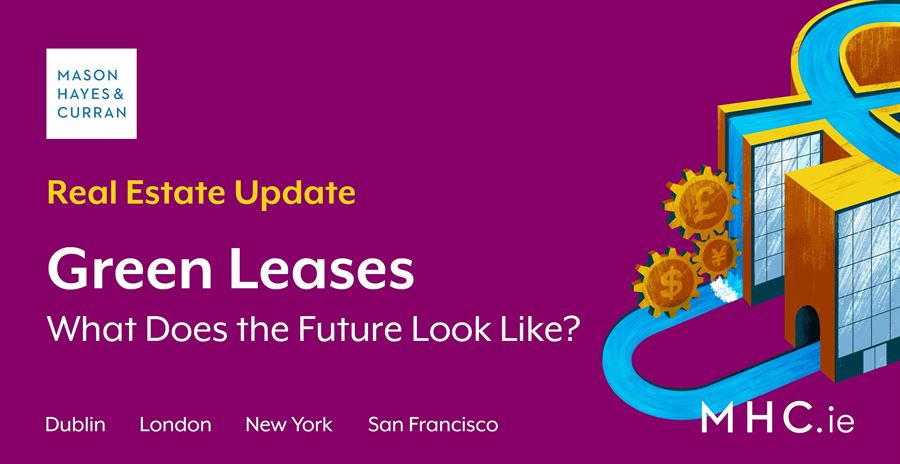Green Leases – What Does the Future Look Like?

Reducing carbon emissions and increasing sustainability is at the forefront of individual, corporation and government agendas right now. The built environment sector is responsible for approximately 39% of all carbon emissions in the world so this industry has a substantial role to play going forward.
The Irish Government has this week published the Climate Action and Low Carbon Development (Amendment) Bill 2021 which sets out the Government’s policies to achieve a climate neutral economy by no later than 2050, and a 51% reduction in emissions by the end of this decade.
Many companies have already invested in sustainability as part of their own corporate social responsibility, and many individuals are seeking out workplaces that align with their values and priorities on climate action.
What are the main benefits for landlords?
-
With increased awareness and focus on sustainability by investors and occupiers alike, better sustainability credentials may impact a building’s marketability and value. Improved environmental credentials will attract the increasing number of tenants that focus on meeting their and their stakeholders’ environmental, social and corporate governance (ESG) requirements. This creates a competitive market advantage over alternative properties which do not meet the same standards.
-
Green leases will assist landlords to meet existing and future environmental regulations.
What are the main benefits for tenants?
-
Reduced operating costs in the occupation of an energy efficient building for things such as electricity, HVAC and water.
-
Occupying a ‘green’ building can form part of a tenant’s ESG requirements, which in turn can appeal to employees and help a tenant to recruit and retain the best talent. For retail tenants, green stores can appeal to the environmentally conscious consumer.
-
Some studies have shown a link between buildings with better sustainability credentials and increased wellbeing and productivity of employees.
What are the key considerations when entering a green lease?
Green lease clauses can range from ‘light green’ to ‘dark green’ depending on the nature of the property, any energy performance certifications etc. In negotiating green lease provisions, it is important to consider:
-
The building’s energy performance certifications, for example: LEED (Leadership in Energy and Environmental Design), which is currently the most common green building certification for commercial premises in Ireland, and any Building Energy Rating (BER). A landlord will want to ensure that a tenant’s occupation, use, fit out or alterations to a premises do not negatively impact on any existing green rating.
-
The intended goal of the green lease provisions and whether certain provisions are to be mandatory or aspirational in nature requiring cooperation between the parties.
-
Which ‘green’ covenants may be appropriate, for example, (1) co-operation obligations relating to the environmental performance of the building, (2) a covenant to share environmental performance data the parties hold and (3) covenants not to adversely affect the LEED or BER rating of the building.
-
The costs associated with the initial construction and ongoing operation and maintenance of a ‘green’ building and compliance by a tenant with any ‘green’ covenants. The lease should be clear in who will provide what services to achieve intended energy performance goals and how any associated costs will be borne.
Conclusion
Green leasing provides an effective framework for both landlords and tenants to work together in achieving a common objective and in complying with future legislative requirements. As outlined above, a sustainable building with lower running costs is more marketable for landlords and more cost effective for tenants to occupy. Given the evolving nature of green leases it is prudent to take legal and professional advice before entering such leases to ensure that the provisions are suitable for your organisation.
For more information on green leases and any other queries about commercial leases, please contact a member of our Real Estate team.
The content of this article is provided for information purposes only and does not constitute legal or other advice.
Share this:




